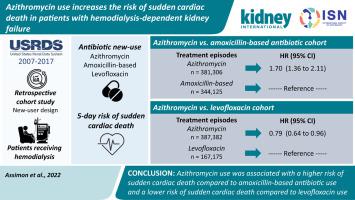Kidney International ( IF 14.8 ) Pub Date : 2022-06-23 , DOI: 10.1016/j.kint.2022.05.024 Magdalene M Assimon 1 , Patrick H Pun 2 , Lily Wang 3 , Sana M Al-Khatib 4 , M Alan Brookhart 5 , David J Weber 6 , Wolfgang C Winkelmayer 7 , Jennifer E Flythe 8

|
Azithromycin is an antibiotic with QT-prolonging potential commonly prescribed to individuals receiving hemodialysis. Hemodialysis patients have a high prevalence of clinical conditions, such as structural heart disease, that can enhance the pro-arrhythmic effects azithromycin, but were excluded from prior investigations evaluating the cardiac safety of azithromycin. Using data from the United States Renal Data System (2007-2017), we conducted two cohort studies to examine the cardiac safety of azithromycin relative to amoxicillin-based antibiotics (amoxicillin, amoxicillin/clavulanic acid) and levofloxacin (a fluoroquinolone antibiotic known to prolong the QT-interval) in the hemodialysis population. The primary outcome was five-day sudden cardiac death. Using inverse probability of treatment weighted survival models, we estimated hazard ratios, risk differences, and 95% confidence intervals. The azithromycin vs. amoxicillin-based antibiotic cohort included 282,899 patients and 725,431 treatment episodes (381,306 azithromycin and 344,125 amoxicillin-based episodes). Azithromycin vs. amoxicillin-based antibiotic treatment was associated with higher relative and absolute risks of sudden cardiac death, weighted hazard ratio of 1.70 (95% Confidence Interval, 1.36 to 2.11) and weighted risk difference per 100,000 treatment episodes of 25.0 (15.5 to 36.5). The azithromycin vs. levofloxacin cohort included 245,143 patients and 554,557 treatment episodes (387,382 azithromycin and 167,175 levofloxacin episodes). Azithromycin vs. levofloxacin treatment was associated with lower relative and absolute risks of sudden cardiac death, weighted hazard ratio of 0.79 (0.64 to 0.96) and weighted risk difference per 100,000 treatment episodes of -18.9 (-35.5 to -3.8). Thus, when selecting among azithromycin, levofloxacin, and amoxicillin-based antibiotics, clinicians should weigh the relative antimicrobial benefits of these drugs against their potential cardiac risks.
中文翻译:

使用阿奇霉素会增加血液透析依赖性肾衰竭患者心源性猝死的风险
阿奇霉素是一种具有延长 QT 潜力的抗生素,通常用于接受血液透析的患者。血液透析患者患有结构性心脏病等临床疾病的比例很高,这些疾病可以增强阿奇霉素的促心律失常作用,但被排除在先前评估阿奇霉素心脏安全性的研究之外。使用美国肾脏数据系统(2007-2017)的数据,我们进行了两项队列研究,以检查阿奇霉素相对于阿莫西林类抗生素(阿莫西林、阿莫西林/克拉维酸)和左氧氟沙星(一种已知可延长寿命的氟喹诺酮类抗生素)的心脏安全性。血液透析人群中的 QT 间期)。主要结局是五天心源性猝死。使用治疗加权生存模型的逆概率,我们估计了风险比、风险差异和 95% 置信区间。阿奇霉素与阿莫西林抗生素队列包括 282,899 名患者和 725,431 次治疗(381,306 次阿奇霉素治疗和 344,125 次阿莫西林治疗)。阿奇霉素与阿莫西林抗生素治疗相比,心源性猝死的相对和绝对风险较高,加权风险比为 1.70(95% 置信区间,1.36 至 2.11),每 100,000 次治疗的加权风险差为 25.0(15.5 至 36.5) )。阿奇霉素与左氧氟沙星队列包括 245,143 名患者和 554,557 次治疗(阿奇霉素 387,382 次,左氧氟沙星 167,175 次)。阿奇霉素与左氧氟沙星治疗相比,心源性猝死的相对和绝对风险较低,加权风险比为 0.79(0.64 至 0.96),每 100,000 次治疗的加权风险差为 -18.9(-35.5 至 -3.8)。因此,在选择阿奇霉素、左氧氟沙星和阿莫西林类抗生素时,临床医生应权衡这些药物的相对抗菌益处及其潜在的心脏风险。











































 京公网安备 11010802027423号
京公网安备 11010802027423号